21 Proven Benefits Of Watermelon, Nutrition Value, & Facts
From preventing sun stroke to boosting energy levels, this summer treat has many benefits.
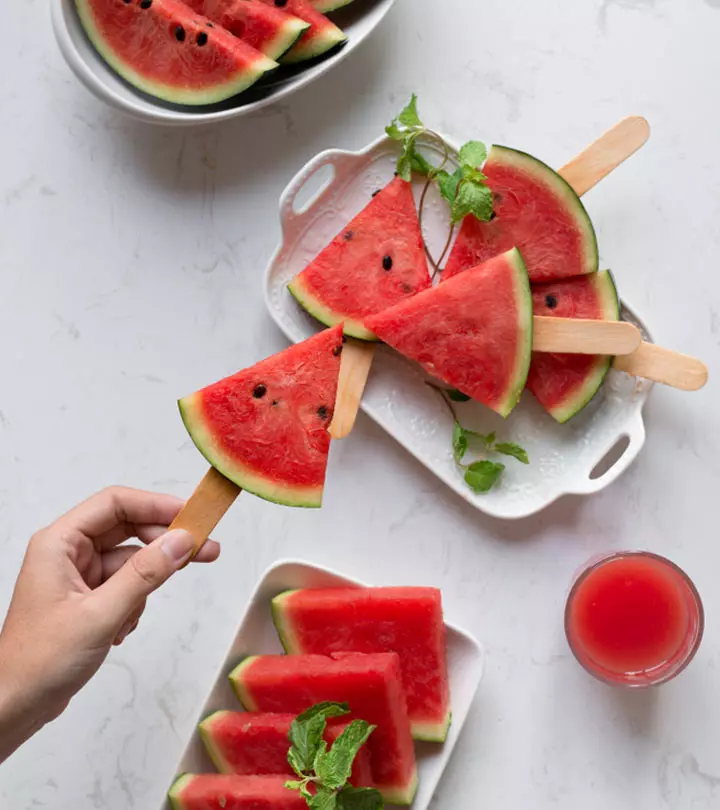
Image: Shutterstock
Watermelon is one of the go-to foods in summers that help combat the scorching heat. However, the benefits of watermelon are numerous and are gaining the attention of many researchers.

From providing relief from the heat to reducing cancer risk, there are several benefits of eating watermelon. They are not only hydrating but also packed with essential nutrients like vitamins A and C, making them a fantastic addition to your diet.
It was a favorite summer treat for many of us and continues to be so because of its uniquely mild sweetness.
Read on to know more about watermelon, its nutrition facts, benefits, and potential side effects associated with its overconsumption.
 Know Your Ingredient: Watermelon
Know Your Ingredient: WatermelonWhat Is It?
A big fruit with a green outer covering and pink edible flesh, belonging to the Cucurbitaceae family.
What Are Its Benefits?
Reduces the risk of cancer and strokes, lowers blood pressure levels, promotes heart health, lowers bad cholesterol, and may prevent macular degeneration and asthma.
Who Can Use It?
Pregnant ladies and those with diabetes or blood pressure can consume it. People looking to improve skin, bone, and hair health or lose weight may eat it.
How Often?
While there is no set limit, consuming 2 cups or 300 gms per day is recommended.
Caution
Excessive consumption of the fruit may lead to an increase in blood sugar levels, orange discoloration, bloating, diarrhea, abdominal discomfort, nausea, and liver problems.
In This Article
21 Best Benefits Of Watermelon (Tarbooz)
Watermelon – A Brief History
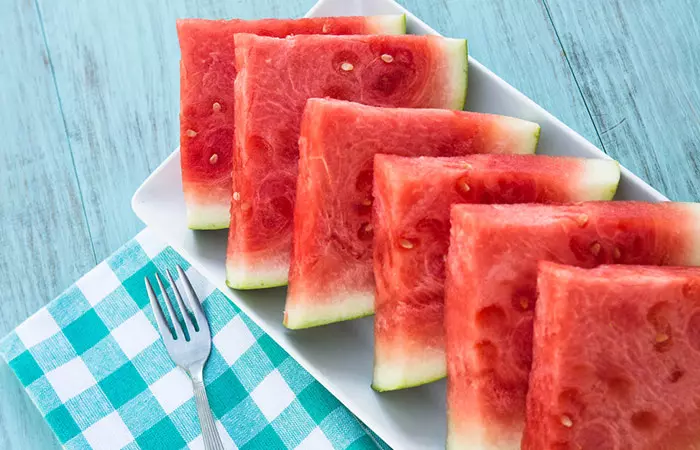
Believed to have originated in South Africa, the watermelon is available in diverse varieties – sweet, bland, and bitter. By the 7th century, watermelons were being cultivated in India. The fruit reached China by the 10th century, and today, the country is the largest watermelon producer in the world.
Per Capita Consumption Of Watermelon In The US (2000 – 2025)
Watermelon is a water-rich fruit with many beneficial nutrients. The moderate consumption of watermelon offers many health benefits. According to one report, the U.S. per capita consumption of fresh watermelons was approximately 14.3 pounds in 2025. This means that the average American eats 14.3 pounds of watermelon each year. Check out the chart below for detailed info on the per capita consumption of watermelon from 2000-2025.
Per Capita Consumption Of Watermelon In The US (2000 - 2020)
Source: Statista Fun Fact
Fun FactThat’s the brief. Coming to its goodness…
Key Takeaways
- Watermelon is a great way to stay hydrated in the summer, with around 92% of its weight being water.
- It is also ideal for consumption by people with diabetes and blood pressure.
- It is loaded with lycopene, which is responsible for most of the fruit’s benefits.
- However, overconsumption of watermelon has some negative effects too.
Is Watermelon Good For You?
This juicy fruit that we so lovingly devour in summers is replete with nutrients. It is rich in potassium and vitamins A, C, and B. But what makes the watermelon fruit a must-have is lycopene, the antioxidant that renders the fruit its deep red color.
 Trivia
TriviaNumerous studies have supported the beneficial effects of lycopene. The antioxidant is known to reduce the risk of stroke and also lower the blood pressure levels.
Mariam Shittu, a blogger, shared her three-day experience of following a “Watermelon Island” cleanse. She decided to consume only watermelon and nothing else for that specific period. Talking about the results, she said, “I feel great. I’m full of energy and very happy I went through with this to the end (i).”
It may not have as much fiber as other fruits, but watermelon has low calorie and fat content and contains a lot of water. This was about the importance of watermelon fruit, now have a look at watermelon nutritional benefits.
Watermelon Nutritional Value
| Watermelon (Citrullus lanatus), fresh | ||
| Nutritional Value per 100 g | ||
| (Source: USDA National Nutrient data base) | ||
| Principle | Nutrient Value | Percentage of RDA |
|---|---|---|
| Energy | 30 Kcal | 1.5% |
| Carbohydrates | 7.6 g | 6% |
| Protein | 0.6 g | 1% |
| Total Fat | 0.15 g | 0.5% |
| Cholesterol | 0 mg | 0% |
| Dietary Fiber | 0.4 g | 1% |
| Vitamins | ||
| Folates | 3 µg | 1% |
| Niacin | 0.178 mg | 1% |
| Pantothenic acid | 0.221 mg | 4.5% |
| Pyridoxine | 0.045 mg | 3.5% |
| Thiamin | 0.033 mg | 3% |
| Vitamin A | 569 IU | 19% |
| Vitamin C | 8.1 mg | 13.5% |
| Vitamin E | 0.05 mg | 0.5% |
| Vitamin B6 | 0.1 mg | 3% |
| Electrolytes | ||
| Sodium | 1 mg | 0% |
| Potassium | 112 mg | 2.5% |
| Minerals | ||
| Calcium | 7 mg | 0.7% |
| Copper | 42 µg | 4.5% |
| Iron | 0.24 mg | 3% |
| Magnesium | 10 mg | 2.5% |
| Manganese | 0.038 mg | 1.5% |
| Zinc | 0.10 mg | 1% |
| Phyto-nutrients | ||
| Carotene-alpha | 303 µg | — |
| Crypto-xanthin-beta | 78 µg | — |
| Lutein-zeaxanthin | 8 µg | — |
| Lycopene | 4532 µg | — |
| Citrulline | 250 mg | |
Calories
Watermelon is quite low in calories. A single serving of watermelon contains just about 46 calories.
Vitamins
The fruit is replete with vitamins. Two of the major vitamins in watermelon are vitamins A and C. The vitamin A in watermelon is present in the form of carotenoids. Watermelon is also a good source of vitamin C. A cup of fresh watermelon contains about 12 milligrams of vitamin C.
Potassium
A cup of diced watermelon contains about 4% of the recommended Daily Value for potassium.
Fiber
Around 175-200 calories of fresh watermelon gives you 3-4 grams of dietary fiber, which is a nice mix of soluble and insoluble fiber.
Carbohydrates
A single serving of watermelon contains about 11.6 grams of carbohydrates, which is a combination of dietary fiber, starch, and sugars.
Fat Content
The fruit has very less fat content. A single serving has just about 0.2 grams of total fat.
Lycopene
One of the most important nutrients in watermelon that is responsible for most of its benefits.
Well, that’s about nutritional value of watermelon. Now, let’s see what are the amazing watermelon benefits!
Health Benefits Of Watermelon
1. Keeps Your Heart Healthy

According to research, having a slice of watermelon every day can halt the accumulation of bad cholesterol, thereby preventing heart disease. A 2019 study published in the Current Developments In Nutrition journal investigated the effects of fresh watermelon consumption on cardiovascular disease risk factors in overweight and obese adults. In a crossover study, 33 participants consumed either two cups of fresh watermelon or isocaloric low-fat cookies daily for four weeks, with a washout period in between. Results showed that watermelon consumption significantly reduced body weight, BMI, waist-to-hip ratio, systolic blood pressure, triglycerides, LDL cholesterol, and oxidative stress markers while improving HDL cholesterol and antioxidant capacity (1). Regular consumption of watermelon has also been linked to fewer fatty deposits inside the blood vessels.
These heart-healthy properties of watermelon can be attributed to citrulline, a chemical found in the fruit. As per a Kentucky study, citrulline can have beneficial effects on atherosclerosisi Hardening and narrowing of arteries through fat and cholesterol plaques on the inner lining of an artery wall over time. (2). Citrulline has also been found to reduce arterial stiffness in postmenopausal women (3).
2. Helps Treat Inflammation
Another primary compound found in watermelons is lycopene, which has great benefits. In one American study, lycopene was found to exhibit anti-inflammatory properties. A 2007 animal study published in the Journal Of Food Science explored the anti-inflammatory properties of lycopene, a carotenoid found in tomatoes, watermelon, and other red-orange fruits. Researchers found that lycopene significantly suppressed inflammation in animal macrophage cells (4).
Amongst the different carotenoids, lycopene is considered the best (5). In fact, the beneficial effects of lycopene for inflammation are considered even better than beta-carotene, an important carotenoid (6).
3. Keeps You Hydrated
Wondering what percentage of watermelon is water? As the name of the fruit implies, watermelon is 90% water, making it one of the best sources of hydration (7). It is far better than alcohol or caffeine in terms of being a diuretic. As it is a natural source, it increases urination without stressing the kidneys (8).
4. Helps Combat Cancer
Credit for one of the best watermelon uses goes yet again to lycopene. According to a study, lycopene in watermelons has been found to reduce the extent of cancer insurgence. A 2008 review published in the American Journal of Therapeutics highlights the potential role of lycopene in cancer prevention and treatment. Studies suggest that an inverse relationship exists between dietary lycopene intake and cancer risk, while preclinical research indicates that lycopene possesses strong antitumor effects both in vitro and in vivo. However, clinical trials on lycopene’s efficacy in cancer therapy are still in their early stages, and current data are insufficient to draw definitive conclusions (9).
Lycopene is the pigment that renders watermelons their characteristic red color, and since it is a powerful antioxidant, it prevents the onset of certain cancers (10).
A 100 g serving of fresh watermelon contains about 50 milligrams of lycopene, which battles free radicals and protects against numerous types of cancer (11). According to a Chicago study, lycopene exhibits chemopreventive properties, especially in prostate cancer cells (12).
Lycopene has also been found useful in the treatment of HPV (human papillomavirus) infection, which might otherwise lead to uterine cancer (13).
5. Might Help Relieve Muscle Soreness
If your sore muscles trouble you after a workout, watermelon might hold the key. The fruit is packed with electrolytes and the amino acid citrulline, which help soothe sore muscles after a heavy workout (14). And as per an Iranian study, citrulline in watermelons can help reduce muscle fatigue (15).
Citrulline has also been externally added to watermelon juice to check its effects, and it has been proven that it is only the naturally occurring citrulline in watermelons that has any effect on muscle soreness (16).
Citrulline has been found to accelerate the process of lactic acid removal, thereby relieving muscle soreness (17). Drinking watermelon juice can also help your muscles receive more oxygen – this helps them recover faster (18).
6. Aids Digestion
Watermelon, as we have seen, contains huge amounts of water, and hence can aid digestion. It also contains fiber, thus promoting digestion and preventing constipation.
7. Is Good For Pregnant Women
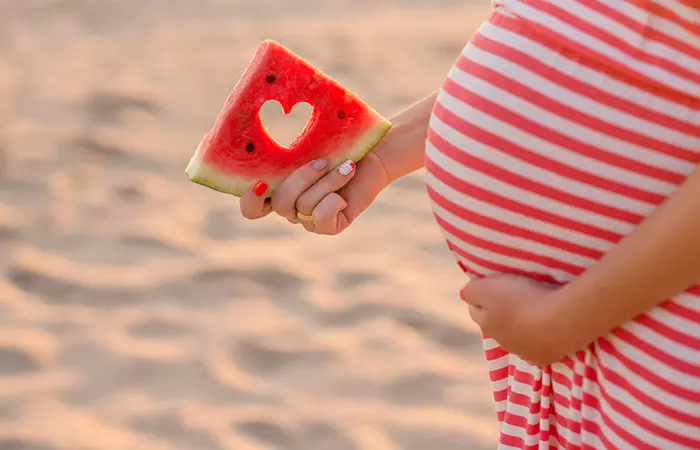
Watermelon eases heartburn, a common condition during pregnancy. It also helps alleviate morning sickness (19). The minerals in the fruit can help prevent third-trimester muscle cramps.
Watermelon can be good for pregnant women in other ways as well.
8. Might Prevent Macular Degeneration
As we have seen, watermelons are an excellent source of lycopene – which was found to reduce the risk of macular degenerative disease (20).
Lycopene has been suggested as a potential treatment for eye disorders such as macular degeneration (21). However, further studies are required in this regard.
Antioxidants are essential for eye health as they offer protection against free radicals. The effect of free radicals can be scary – they might lead to the deterioration of the eye lens, and can even cause blindness. Lycopene, being a potent antioxidant, prevents this (22).
9. Prevents Asthma
Hail lycopene, again! Being one of the key antioxidants, lycopene helps with the body’s reaction to cold and flu. And what’s more interesting is this antioxidant has been found to reduce asthma flare-ups in children (23).
Watermelon also allows people who have asthma to breathe properly, without them having to take each breath in panic (24). A study conducted on 17 asthmatic adults showed that lycopene might have a therapeutic effect on the disease (25).
As per a report, adequate intake of lycopene and vitamin A could be beneficial for asthmatic patients (26).
10. Controls Blood Pressure
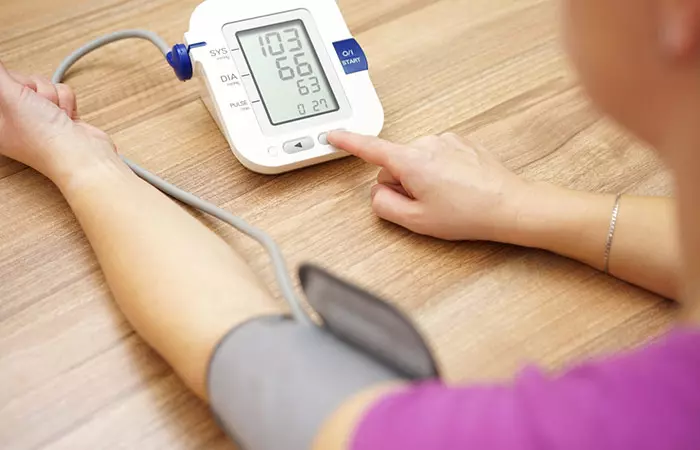
Watermelon is the richest natural source of citrulline. And according to a study published by the Florida State University, citrulline is closely related to arginine, which is an amino acid essential for maintaining healthy blood pressure (27).
Another study that had volunteers consuming concentrated watermelon juice found increased levels of arginine in them, which was likely to have been converted from citrulline (28).
Watermelon also is a good source of potassium, the nutrient that is known to lower high blood pressure (29). Potassium is also an electrolyte that regulates blood pressure during physical exercise (30).
11. Improves Skin And Hair Health
Watermelon is a good source of vitamin C, the nutrient that is essential for collagen synthesis (31). Collagen keeps your skin supple and strengthens your hair.
According to a German study, lycopene and beta-carotene can protect the skin against sunburn (32). Beta-carotene is also known to prevent certain skin conditions like psoriasis and vitiligo (33).
The vitamin A in watermelon is another important nutrient that contributes to skin health – it repairs and creates new skin cells. Without the nutrient, your skin would appear dull and flaky.
12. Improves Bone Health
Vitamin C plays a major role here as the nutrient is good for the bones and aids wound healing (34). A Switzerland study suggests that lycopene supplementation can prevent osteoporosisi A medical condition making bones weak and brittle when new bone formation fails to replace old ones. and bone fractures (35).
Vitamin A in watermelons has been linked to bone growth (36).
13. Aids Weight Loss

One of the best watermelon health benefits is that it aids in healthy weight loss too. Yes, given its high water content, watermelon can fill you up for fewer calories (37). Water has also been found to speed up metabolism and flush out toxins and fats, which eventually might contribute to weight loss (38).
One wedge of watermelon has just about 86 calories, less than 1 gram of fat, and no cholesterol. It provides 22 grams of carbs and 5% of your daily fiber requirement, making it a great food for fat burning and weight loss (39).
14. Offers Kidney Support
Though watermelons could be good sources of potassium, the percentage is lower compared to most other foods. This is why it can be good for people suffering from chronic kidney disease, who need to stick to lower-potassium fruit options (40).
However, in some individuals suffering from chronic kidney disease, the kidneys may not be able to remove the excess potassium from the blood. This can raise potassium levels in the blood and lead to complications.
15. Strengthens Immunity
Watermelon, being rich in vitamin C, strengthens the body’s immune system (41). The fruit also contains vitamin B6 that helps the immune system produce antibodies (42). The vitamin also aids in the formation of red blood cells. The fruit has vitamin A that regulates the immune system and protects it from infections (43).
16. Helps Treat Diabetes
What is the link between watermelon and diabetes? Although watermelon has a high glycemic index, it has a lower glycemic load (the value by which a particular food will raise an individual’s blood glucose levels), and hence is suitable for diabetics.
In a Nigerian study, watermelon was found to have anti-diabetic properties (44). Another study showed the beneficial effects of watermelon pomace juice – it increases the mass of brown adipose tissuei A loose connective tissue that synthesizes large fat globules within a definite structure of fiber network. and reduces excess white fat mass, which eventually helps treat diabetes (45).
However, take your doctor’s advice in this regard – as certain small-scale studies have stated otherwise.
17. Can Promote Sexual Health
The amino acid citrulline in watermelon relaxes and dilates the blood vessels and might aid in the treatment of erectile dysfunction (46). Citrulline is converted into arginine, which is a precursor for nitric oxide that helps in blood vessel dilation.
According to an Italian study, oral citrulline supplementation has been found to improve erection hardness in men suffering from mild erectile dysfunction (47).
Watermelon can also act as a natural viagra (48). The ingredients in watermelon, especially the phytonutrients, react with the human body and trigger such reactions.
18. Can Prevent Cell Damage
Watermelon, being rich in lycopene, protects the cells from damage associated with heart disease. Lycopene fights the free radicals and prevents cell damage (49).
19. Prevents Heat Stroke

Given its high water content, watermelon is known to prevent hyperthermia (50).
It has a lot of significance in Chinese medicine as well – watermelon is one of the few fruits that clears heat and relieves irritability and thirst. It also relieves heat exhaustion, for which the outermost layer of the rind is used (50).
20. Promotes Healthy Gums
The vitamin C in watermelon keeps the capillaries and gums healthy . The deficiency of vitamin C can cause bleeding gums and gingivitis (inflammation of the gums), and watermelon can prevent these conditions (51).
The vitamin C in watermelon can also kill the bacteria in the mouth that might otherwise lead to gum disease and other gum infections.
21. Boosts Energy Levels
Watermelon is a good source of vitamin B, which is responsible for energy production in your body (52). The fruit is low in calories and high in energy, and it can help you stay active for the better part of the day (53).
Another reason you must have a watermelon to stay at the top of your game is potassium. Potassium is an electrolyte that keeps you from feeling tired after an exhausting day (54).
Apart from the fruit, its seeds also contain high amounts of nutrients. Check out the next section to learn how watermelon seeds can benefit your health.
Benefits Of Watermelon Seed
Watermelon seeds are packed with protein, fat, and other minerals, making them popular as snacks, fat binders, soup thickeners, and condiments. They are rich in antioxidants like tannins and saponins. Tannins have anti-diabetic, wound-healing, and anti-tumor properties. They have been linked to the treatment of sore throat, and hemorrhage. The seeds are also an excellent source of fiber, which is crucial for keeping your digestive system healthy (55).
Animal studies found that watermelon seed oil could decrease serum cholesterol, triglyceride, and LDL levels and increase levels of HDL without compromising liver integrity (56). While all these studies demonstrate the therapeutic potential of watermelon seeds, more human studies are required to establish these claims.
Watermelon, as we have seen, is not just replete with water – but with great benefits as well. You will be surprise to know interesting facts about watermelon – what we will see now.
Stunning Watermelon Facts
- The largest watermelon ever grown weighed 122 kilos! This record was set in 2005, at the Hope Arkansas Big Watermelon Contest.
- There are over 1,200 varieties of watermelon (in 96 countries) that are grown across the world.
- Thought tomatoes are the richest in lycopene? Maybe not. Watermelon contains 40% more lycopene than raw tomatoes.
- The Japanese grow square watermelons. They place the growing fruit inside square glass boxes, and the fruit takes the shape of the container as it grows.
- Literary legend Mark Twain loved watermelon and called it the food of angels.
- It is both a fruit and a vegetable. It is a sweet and seed-producing plant, and the watermelon rind is entirely edible.
What an amazing frui…vege…frui…well, whatever! The benefits of eating watermelon are incredible. The facts are mind-blowing. And now comes the most important part – how do you buy watermelons and store them? What do you need to keep in mind?
Watermelons – Selection And Storage
Selection
- You need to look for a firm and symmetrical watermelon that is free of cuts, bruises, or dents. Any irregular lumps or bumps would mean that the fruit received insufficient amounts of sunshine or water.
- Lift the melon. The fruit must be heavy for its size, which means it is full of water, and therefore, ripe. You can try comparing the melon with another of the same size – the heavier one is what you must go for.
- You need to look for the field spot. This is the spot where the melon sat on the ground in the sun. Hence, the darker the field spot, the better. You will find it on the underside of the watermelon. If the field spot is white or nonexistent, it simply means it was picked too soon (and probably isn’t ripe).
- The perfect watermelon is dark green and looks dull. If the watermelon is shiny, keep it aside.
- In case you are purchasing pre-cut watermelons, choose the pieces with bright red flesh and black or dark brown seeds. Avoid the pieces with white streaks or that have too many white seeds.
Storage
- A whole, uncut watermelon can be stored for up to a week in the refrigerator. Ensure you handle the fruit carefully to avoid bruising. Also, make sure you don’t store the fruit below 4 degrees C as doing so can cause chilling injuries to the fruit.
- You can cut the watermelon as you usually do. Simply run the blade of the knife down the sides of the fruit. This will cut the rind from the flesh. Cut the watermelon into round disks, and then cut the disks into 1-inch cubes. If you are not consuming it immediately, you can place the cut watermelon in a covered container and refrigerate for up to 3-4 days.
- Back To TOC
Adding Watermelon To Your Diet
Yes, having watermelon has its benefits. But one can’t just keep consuming the fruit as it is always, right? How about including the melon in your diet in a few offbeat ways? That’s why we have included a couple of recipes.
1. Watermelon Salad
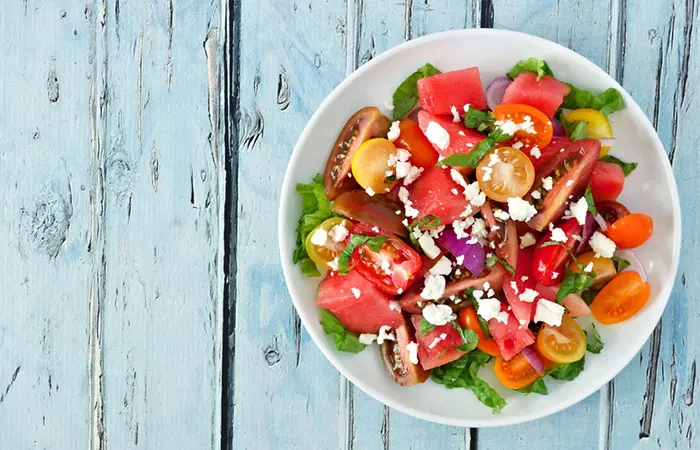
What You Need
- ½ thinly sliced red onion
- 5 cups of cubed watermelon
- 2 cucumbers, cubed
- ¾ cup of chopped cashews
- 150 grams of cubed feta cheese
- 1 handful of fresh mint, minced
- ¼ cup of olive oil
- Juice from a lemon
- A pinch of salt
Directions
- Excluding the olive oil, lemon juice, and salt, combine everything else in a bowl. Mix well.
- Add the olive oil and lemon juice to the mixture.
- Season with the salt.
- Serve.
2. Watermelon Donuts
What You Need
- A seedless watermelon
- Sour cream
- Sugar, to taste
- Vanilla extract, to taste
- Silvered almonds, to layer the donuts
Directions
- Cut donut shapes from the fruit. All you have to do is make 1½-inch thick round slices and make a hole at the center.
- Add sugar to the sour cream and stir to sweeten it. You can also add a touch of vanilla extract to lighten it a little more.
- Frost the watermelon donut slices. Sprinkle them with the silvered almonds.
- Serve.
All great. We have seen the numerous ways watermelons can make your life better. But there is another side to this entire story – the side effects. Yes, watermelon is great. But it does have certain side effects one must be aware of.
Side Effects Of Watermelon
Certain side effects of excessive consumption (which is very rare and would require someone to eat an extremely large amount of watermelon) of watermelon include:
1. Intestinal disturbances
As we have seen, most benefits of watermelon can be attributed to lycopene. And the same compound can also cause side effects if the fruit is consumed in excess. Lycopene overdose can cause nausea, vomiting, indigestion, and diarrhea.
2. Hyperkalemia
Excess consumption of watermelon can result in hyperkalemia, a medical condition where the potassium levels are above normal. This can lead to cardiovascular issues like irregular heartbeats and a weak pulse.
3. Allergic Reactions
Certain individuals might develop allergic reactions to watermelons. These can include mild to severe rashes and facial swelling.
Watermelon is a must-have, especially during summers. No doubt about it. Its high water content makes it a strong weapon against heat stroke and other related issues.
Now you know what is watermelon good for and why you should include it in your daily diet. Start eating watermelon today, and beat the heat like never before!
Infographic: Watermelon: A Sneak Peek
The benefits of watermelons are many, making them a delightful addition to your diet. Summers are the perfect time for these tropical treats as they quench your thirst and boost your health.
You can learn more about watermelons, their popular varieties, their global appeal, and their alternatives from the infographic below.
Some thing wrong with infographic shortcode. please verify shortcode syntax
The refreshing watermelon fruit is perfect for cooling off in the summer heat. It is not only delicious but also replete with the essential nutrients your body needs. It is a good source of dietary fiber, vitamins, minerals, and antioxidants like lycopene. Watermelon’s benefits range from relieving muscle soreness to boosting immunity. It is also beneficial for your hair and skin, keeping them both healthy and supple. Watermelon may also help manage diabetes and weight loss. However, its excessive consumption can cause health issues. It can lead to gastrointestinal issues or trigger allergies. You should limit its use and seek medical advice if you experience any side effects.
Let’s now take a look at a few frequently asked questions.
Frequently Asked Questions
Should I eat watermelon at night?
There is a lack of scientific evidence suggesting that you need to avoid consuming watermelons at night.
Is it OK to eat watermelon seeds?
Yes, watermelon seeds are safe to consume. You can add it to your salads or have them in their powdered form.
Does watermelon make you sleepy?
Possibly. Anecdotal evidence suggests that the rich magnesium content of watermelon may boost your sleep quality and make you sleepy.
Can we drink water after eating watermelon?
No, you do not need to avoid drinking water after having watermelon. However, Ayurveda and anecdotal evidence suggest that drinking water after eating this fruit can dilute the gastric juices and cause acidity, so it should be avoided.
Is watermelon a superfood?
Yes. Watermelon is a nutrient-dense food packed with beneficial nutrients like vitamins A, B, and C, potassium, and lycopene that help promote overall health.
Illustration: Proven Benefits Of Watermelon, Nutrition Value, & Facts
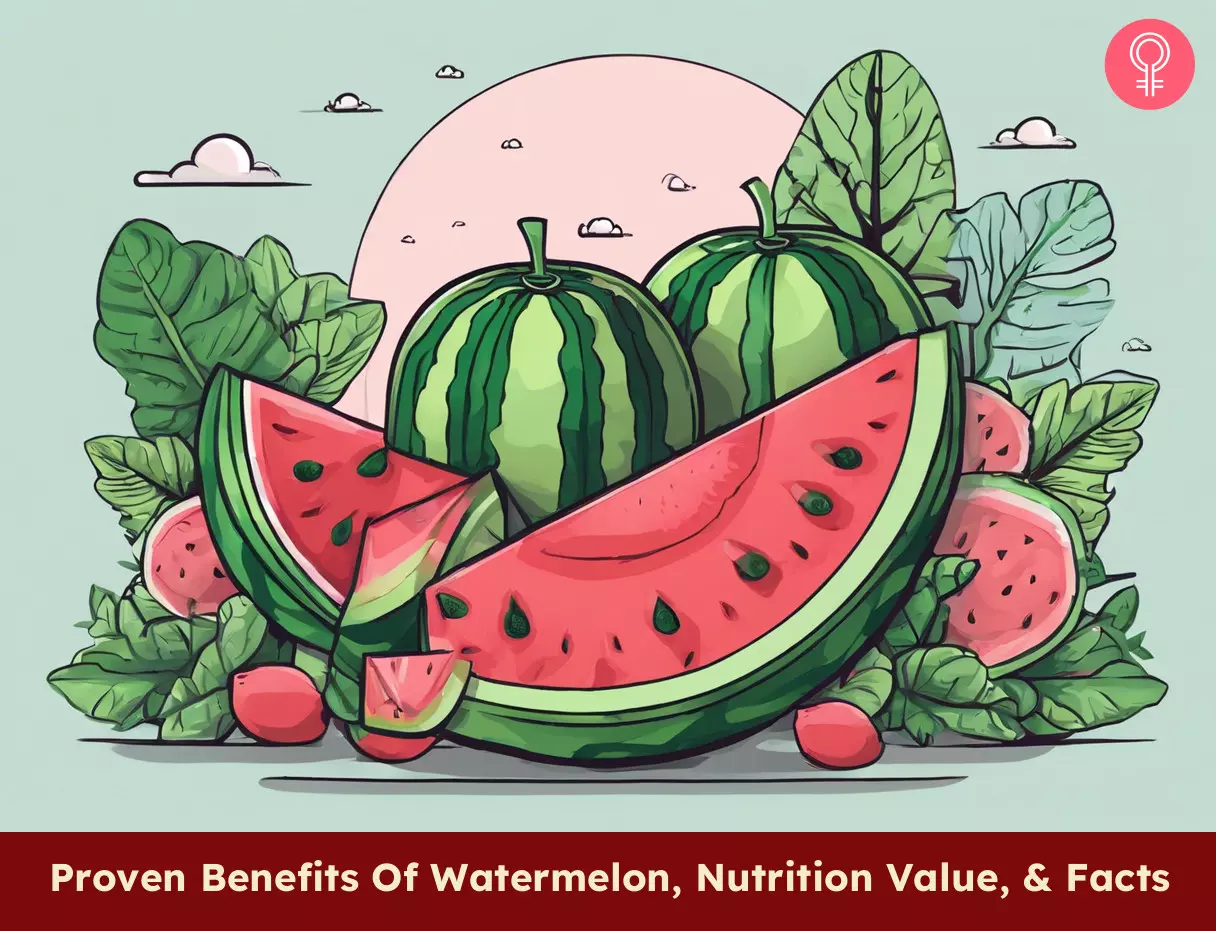
Image: Stable Diffusion/StyleCraze Design Team
Watermelon is a delicious and nutritious fruit with various health benefits. Learn about 11 of them in the following video!
Personal Experience: Source
StyleCraze's articles are interwoven with authentic personal narratives that provide depth and resonance to our content. Below are the sources of the personal accounts referenced in this article.
i. HEALTH|My Watermelon Diet Experiencehttps://mariamshittu.com/2017/08/03/my-watermelon-diet-experience/
References
Articles on StyleCraze are backed by verified information from peer-reviewed and academic research papers, reputed organizations, research institutions, and medical associations to ensure accuracy and relevance. Read our editorial policy to learn more.
- Effect of Fresh Watermelon Consumption on Risk Factors for Cardiovascular Disease in Overweight and Obese Adults (P06-102-19)
https://www.ncbi.nlm.nih.gov/pmc/articles/PMC6574932/ - Citrullus lanatus `Sentinel’ (Watermelon) Extract Reduces Atherosclerosis in LDL Receptor Deficient Mice
https://www.ncbi.nlm.nih.gov/pmc/articles/PMC3504646/ - Effects of watermelon supplementation on arterial stiffness and wave reflection amplitude in postmenopausal women
https://pubmed.ncbi.nlm.nih.gov/23615650/ - Lycopene inhibits LPS-induced proinflammatory mediator inducible nitric oxide synthase in mouse macrophage cells
https://pubmed.ncbi.nlm.nih.gov/17995901/ - Lycopene and kidney; future potential application
https://www.ncbi.nlm.nih.gov/pmc/articles/PMC5297483/ - Lycopene as a Natural Antioxidant Used to Prevent Human Health Disorders
https://www.ncbi.nlm.nih.gov/pmc/articles/PMC7464847/ - Comparison of Watermelon and Carbohydrate Beverage on Exercise-Induced Alterations in Systemic Inflammation, Immune Dysfunction, and Plasma Antioxidant Capacity
https://www.ncbi.nlm.nih.gov/pmc/articles/PMC4997430/ - Citrullus Lanatus (Watermelon) As Diuretic Agent: An In vivo Investigation on Mice
https://www.researchgate.net/publication/271707182_Citrullus_Lanatus_Watermelon_As_Diuretic_Agent_An_In_vivo_Investigation_on_Mice - Lycopene in cancer prevention and treatment
https://pubmed.ncbi.nlm.nih.gov/18223356/ - Watermelon: Lycopene Content Changes With Ripeness Stage, Germplasm, And Storage
https://www.ars.usda.gov/research/publications/publication/?seqNo115=144246 - Quantification of Lycopene, β-Carotene, and Total Soluble Solids in Intact Red-Flesh Watermelon (Citrullus lanatus) Using On-Line Near-Infrared Spectroscopy
https://www.ncbi.nlm.nih.gov/pmc/articles/PMC5421706/ - Multitargeted therapy of cancer by lycopene
https://www.ncbi.nlm.nih.gov/pmc/articles/PMC2615641/ - Lycopene
https://medlineplus.gov/druginfo/natural/554.html - Watermelon juice relieves post-exercise muscle soreness
https://www.acs.org/pressroom/presspacs/2013/acs-presspac-august-14-2013/watermelon-juice-relieves-post-exercise-muscle-soreness.html - Herbs and natural supplements in the prevention and treatment of delayed-onset muscle soreness
https://www.ncbi.nlm.nih.gov/pmc/articles/PMC5329173/ - Effect of citrulline on post-exercise rating of perceived exertion, muscle soreness, and blood lactate levels: A systematic review and meta-analysis
https://pubmed.ncbi.nlm.nih.gov/33308806/ - The Effects of L-Citrulline on Blood-Lactate Removal Kinetics Following Maximal-Effort Exercise
https://pubmed.ncbi.nlm.nih.gov/34013839/ - Biochemical, physiological, and performance response of a functional watermelon juice enriched in L-citrulline during a half-marathon race
https://pubmed.ncbi.nlm.nih.gov/28659740/ - Watermelon and dietary advice compared to dietary advice alone following hospitalization for hyperemesis gravidarum: a randomized controlled trial
https://pubmed.ncbi.nlm.nih.gov/37330467/ - Serum antioxidants and age-related macular degeneration in a population-based case-control study
https://pubmed.ncbi.nlm.nih.gov/7487619/ - Lycopene but not lutein nor zeaxanthin decreases in serum and lipoproteins in age-related macular degeneration patients
https://pubmed.ncbi.nlm.nih.gov/15963792/ - Watermelon lycopene and allied health claims
https://www.ncbi.nlm.nih.gov/pmc/articles/PMC4464475/ - The Effects of Increasing Fruit and Vegetable Intake in Children with Asthma on the Modulation of Innate Immune Responses
https://pubmed.ncbi.nlm.nih.gov/35956264/ - What’s Not To Love About Watermelon?
https://www.ndsu.edu/pubweb/chiwonlee/plsc368/student/papers04/melissawelter/watermelon.htm - An Update on the Health Effects of Tomato Lycopene
https://www.ncbi.nlm.nih.gov/pmc/articles/PMC3850026/ - Revealing the Power of the Natural Red Pigment Lycopene
https://citeseerx.ist.psu.edu/viewdoc/download?doi=10.1.1.383.859&rep=rep1&type=pdf - High blood pressure? Watermelon can take a slice out of numbers, Florida State study says
https://www.fsu.edu/news/2010/10/13/watermelon.study/ - Watermelon Serves Up Medically Important Amino Acid
https://www.ars.usda.gov/news-events/news/research-news/2007/watermelon-serves-up-medically-important-amino-acid/ - Effect of potassium intake on blood pressure
https://pubmed.ncbi.nlm.nih.gov/2104250/ - Potassium regulation during exercise and recovery
https://pubmed.ncbi.nlm.nih.gov/1656509/ - Efficacy of Vitamin C Supplementation on Collagen Synthesis and Oxidative Stress After Musculoskeletal Injuries: A Systematic Review
https://www.ncbi.nlm.nih.gov/pmc/articles/PMC6204628/ - Photoprotection by dietary carotenoids: concept, mechanisms, evidence and future development
https://pubmed.ncbi.nlm.nih.gov/21953695/ - Nutritional Therapy in Persons Suffering from Psoriasis
https://www.ncbi.nlm.nih.gov/pmc/articles/PMC8747310/ - Vitamin C: a wound healing perspective
https://pubmed.ncbi.nlm.nih.gov/24796079/ - Lycopene Deficiency in Ageing and Cardiovascular Disease
https://www.ncbi.nlm.nih.gov/pmc/articles/PMC4736775/ - A New World of Watermelon
https://agresearchmag.ars.usda.gov/ar/archive/2004/dec/world1204.pdf - Cutting Calories
https://www.cdc.gov/healthy-weight-growth/healthy-eating/cutting-calories.html?CDC_AAref_Val=https://www.cdc.gov/healthyweight/healthy_eating/cutting_calories.html? - Water consumption increases weight loss during a hypocaloric diet intervention in middle-aged and older adults
https://pubmed.ncbi.nlm.nih.gov/19661958/ - Effects of Fresh Watermelon Consumption on the Acute Satiety Response and Cardiometabolic Risk Factors in Overweight and Obese Adults
https://www.researchgate.net/publication/331712666_Effects_of_Fresh_Watermelon_Consumption_on_the_Acute_Satiety_Response_and_Cardiometabolic_Risk_Factors_in_Overweight_and_Obese_Adults - Eating Right for Chronic Kidney Disease
https://www.niddk.nih.gov/health-information/kidney-disease/chronic-kidney-disease-ckd/eating-nutrition - Versatile Nutraceutical Potentials of Watermelon—A Modest Fruit Loaded with Pharmaceutically Valuable Phytochemicals
https://www.ncbi.nlm.nih.gov/pmc/articles/PMC7698065/ - Vitamin B6 and immune competence
https://pubmed.ncbi.nlm.nih.gov/8302491/ - Vitamin A, infection, and immune function
https://pubmed.ncbi.nlm.nih.gov/11375434/ - Antioxidative and antidiabetic activities of watermelon (Citrullus lanatus) juice on oxidative stress in alloxan-induced diabetic male Wistar albino rats
https://www.ncbi.nlm.nih.gov/pmc/articles/PMC4697216/ - Potential roles of Citrulline and watermelon extract on metabolic and inflammatory variables in diabetes mellitus, current evidence and future directions: A systematic review
https://onlinelibrary.wiley.com/doi/pdf/10.1111/1440-1681.13190 - Impact of Watermelon (Citrallus lanatus) on Male Fertility
https://pubmed.ncbi.nlm.nih.gov/37417854/ - Oral L-citrulline supplementation improves erection hardness in men with mild erectile dysfunction
https://pubmed.ncbi.nlm.nih.gov/21195829/ - Watermelon May Have Viagra-effect
https://today.tamu.edu/2008/07/01/watermelon-may-have-viagra-like-effect/ - Red Tomato Juice
https://ncit.nci.nih.gov/ncitbrowser/ConceptReport.jsp?dictionary=NCI_Thesaurus&version=16.10e&ns=NCI_Thesaurus&code=C116328 - Oral Administration of Watermelon Rind Extract to Induce Hypothermia in Chicks
https://pubmed.ncbi.nlm.nih.gov/32174763/ - Vitamin C Deficiency
https://www.ncbi.nlm.nih.gov/books/NBK493187/ - A Study on Watermelon (Citrullus Lanatus) Juice Preserved with Chemical
Preservatives at Refrigeration Temperature
https://citeseerx.ist.psu.edu/viewdoc/download?doi=10.1.1.835.3854&rep=rep1&type=pdf - Watermelon, raw
https://fdc.nal.usda.gov/fdc-app.html#/food-details/167765/nutrients - Electrolytes
https://pubmed.ncbi.nlm.nih.gov/31082167/ - Watermelon Seeds as Food: Nutrient Composition,Phytochemicals and Antioxidant Activity.
https://www.researchgate.net/publication/323663320_Watermelon_Seeds_as_Food_Nutrient_CompositionPhytochemicals_and_Antioxidant_Activity - Evaluation of nutritional composition of Citrullus lanatus Linn. (watermelon) seed and biochemical assessment of the seed oil in rats
https://pubmed.ncbi.nlm.nih.gov/34002399/
Read full bio of Alexandra Dusenberry
Read full bio of Ravi Teja Tadimalla
Read full bio of Arshiya Syeda
Read full bio of Sindhu Koganti








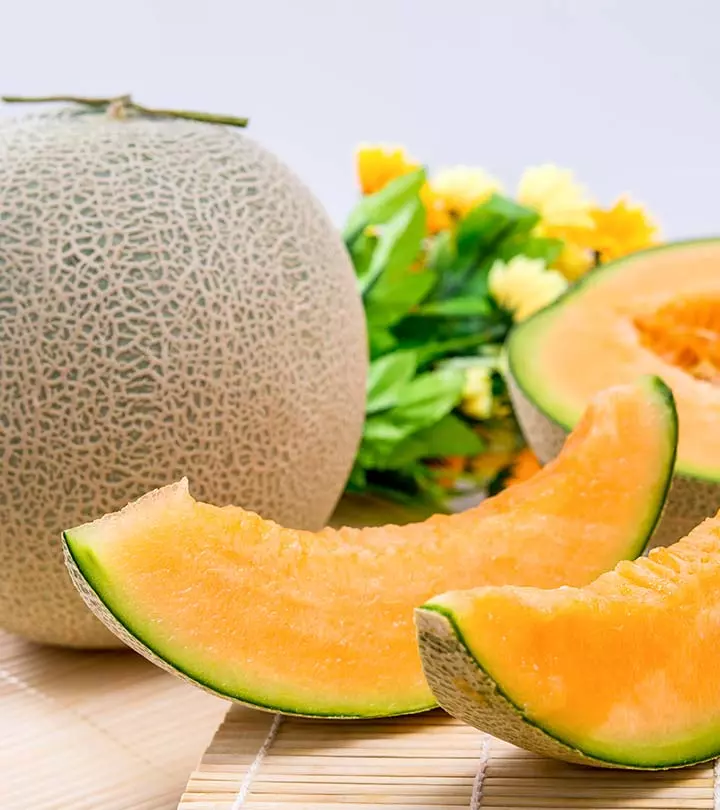
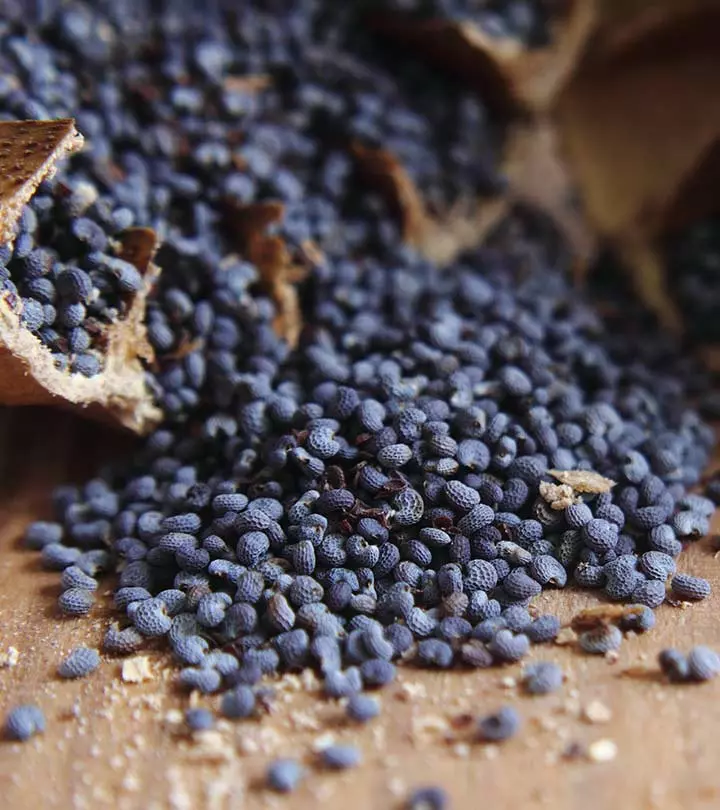
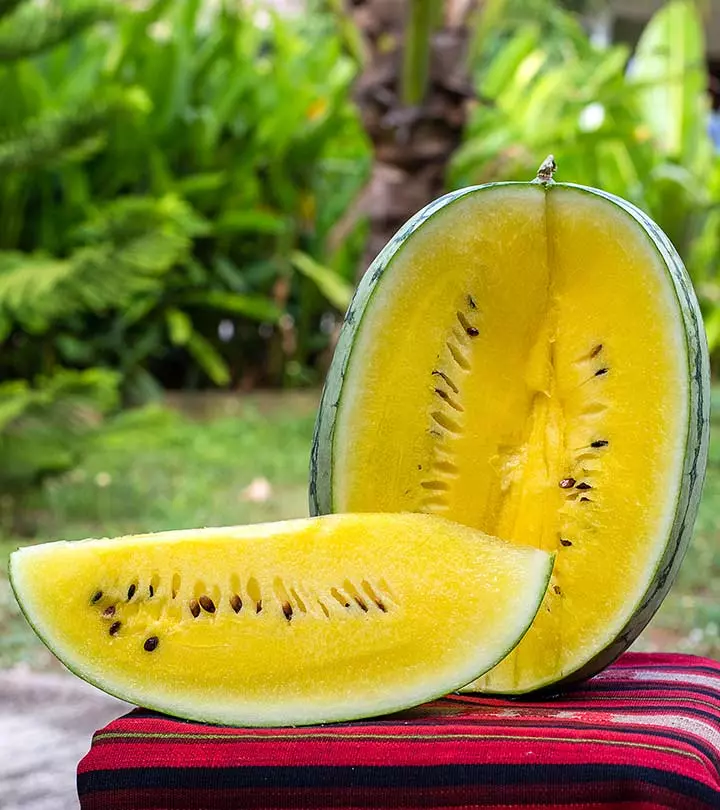
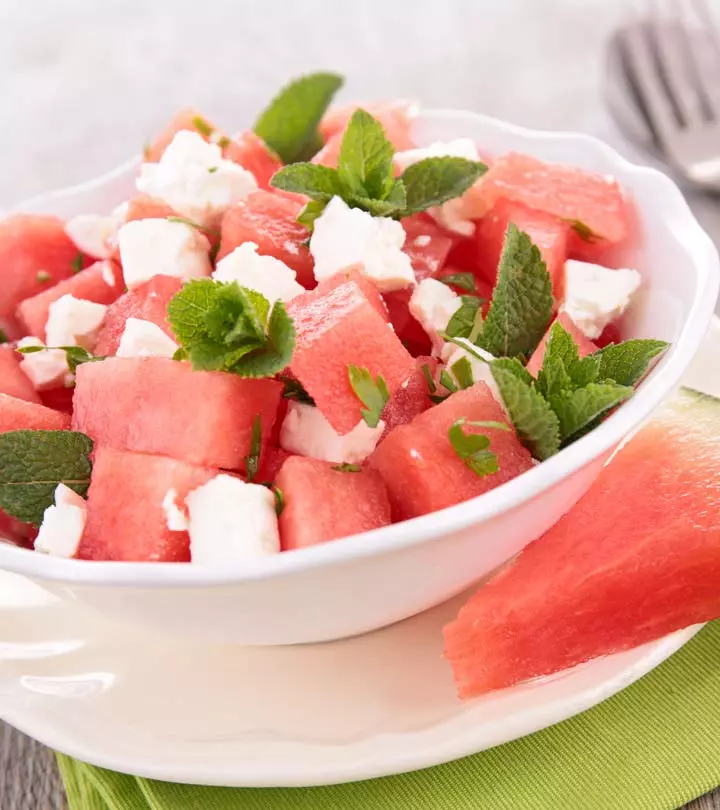
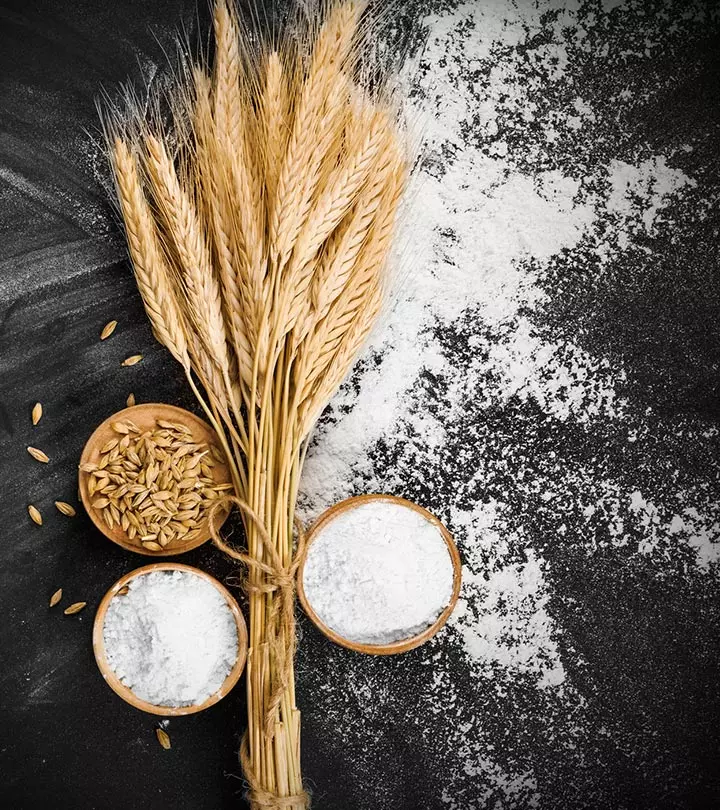
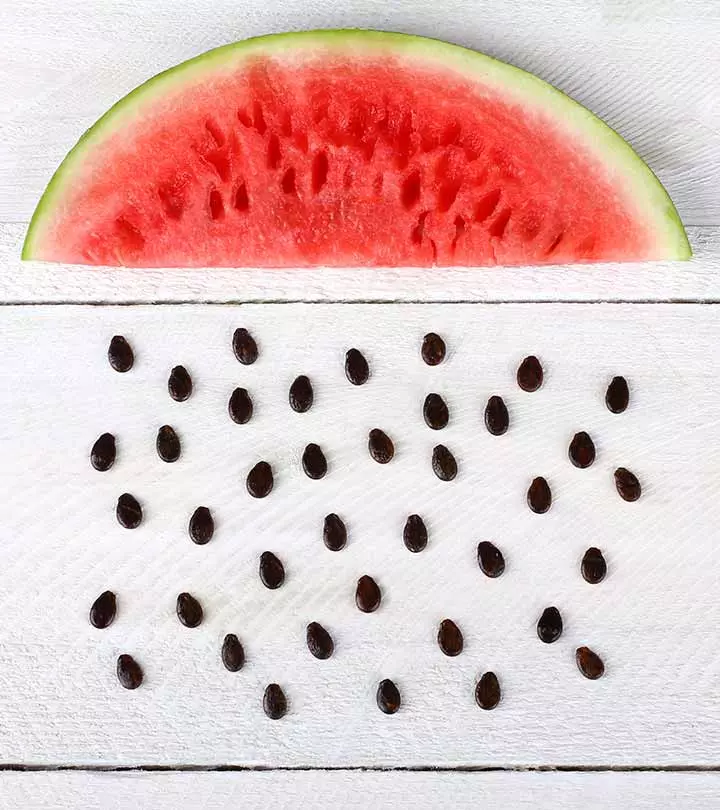
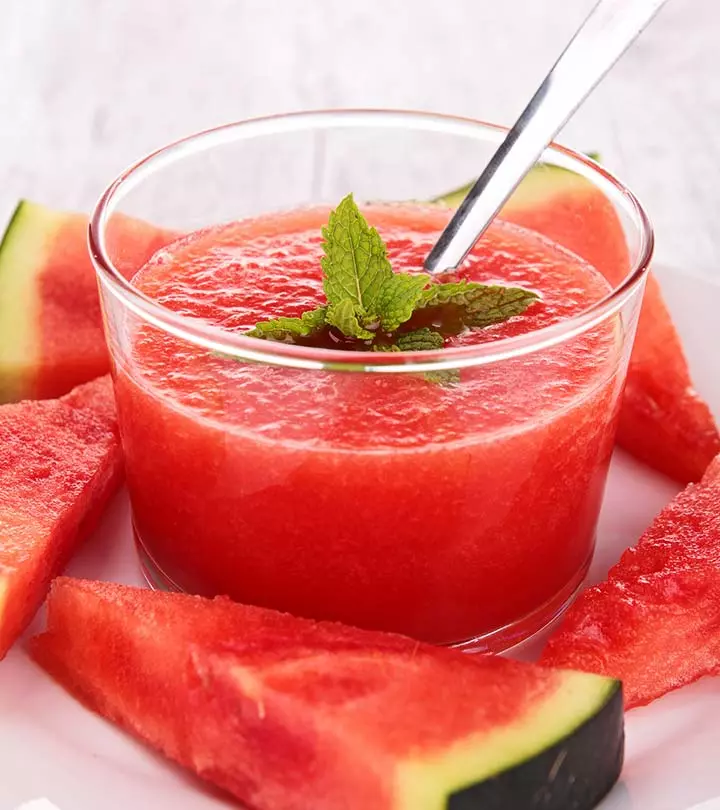
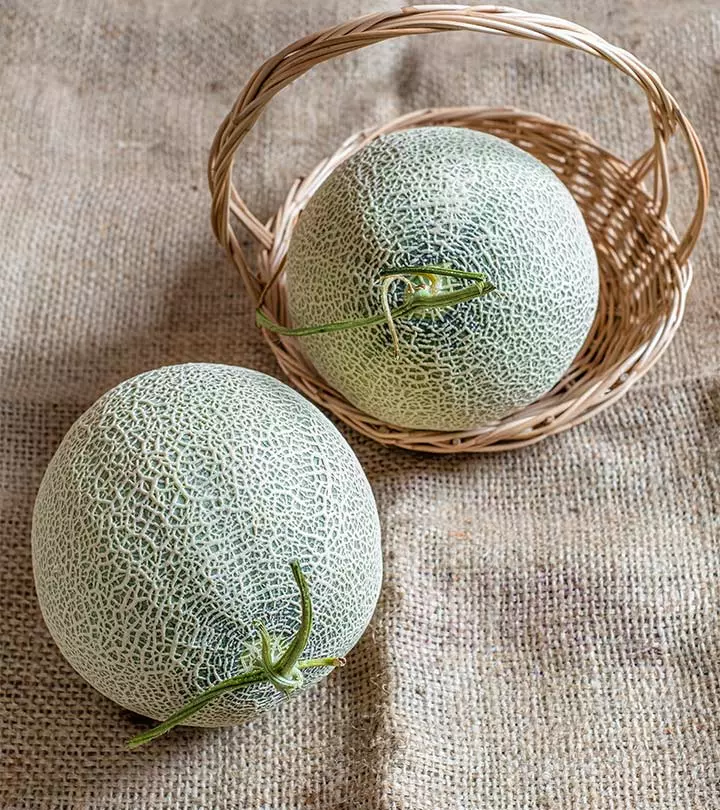
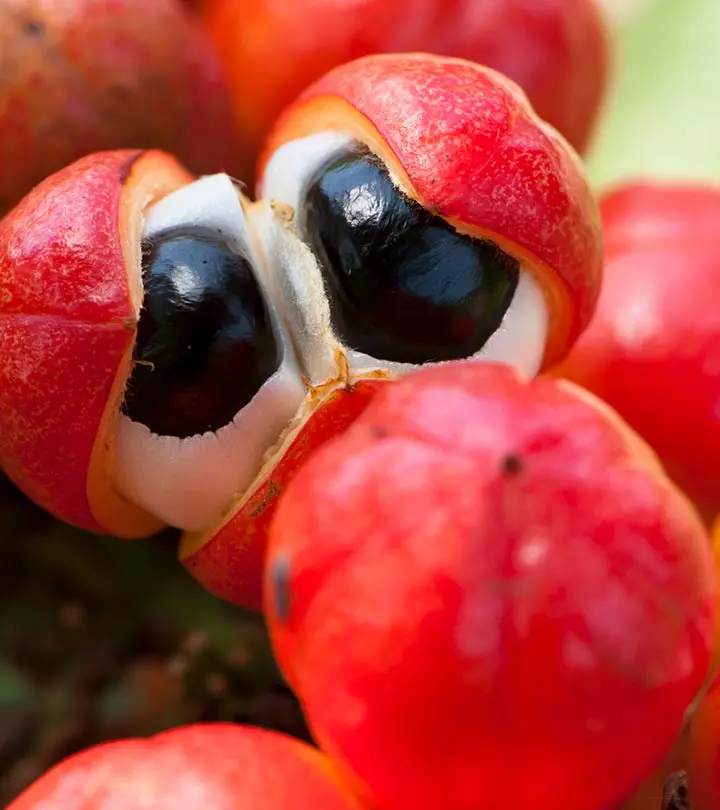
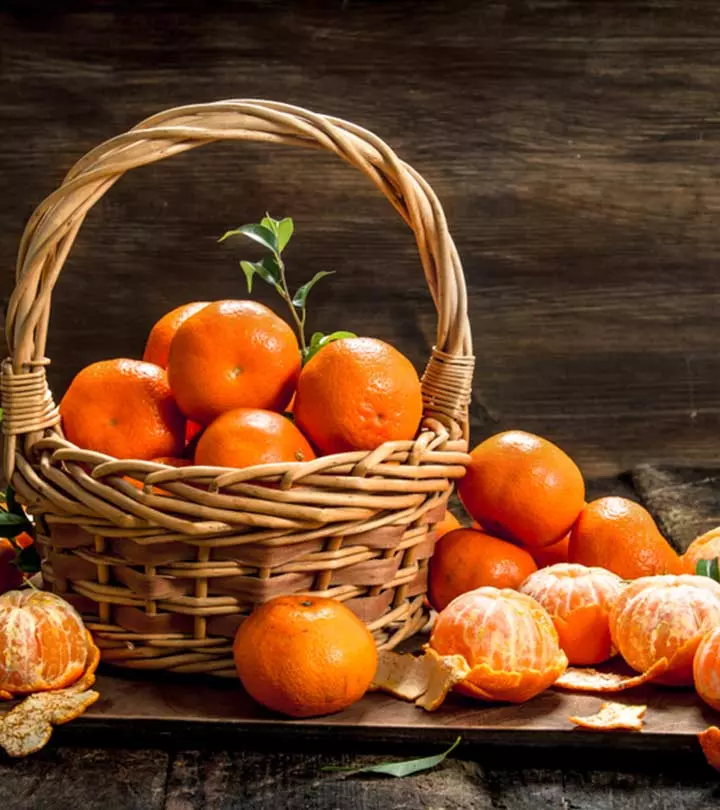
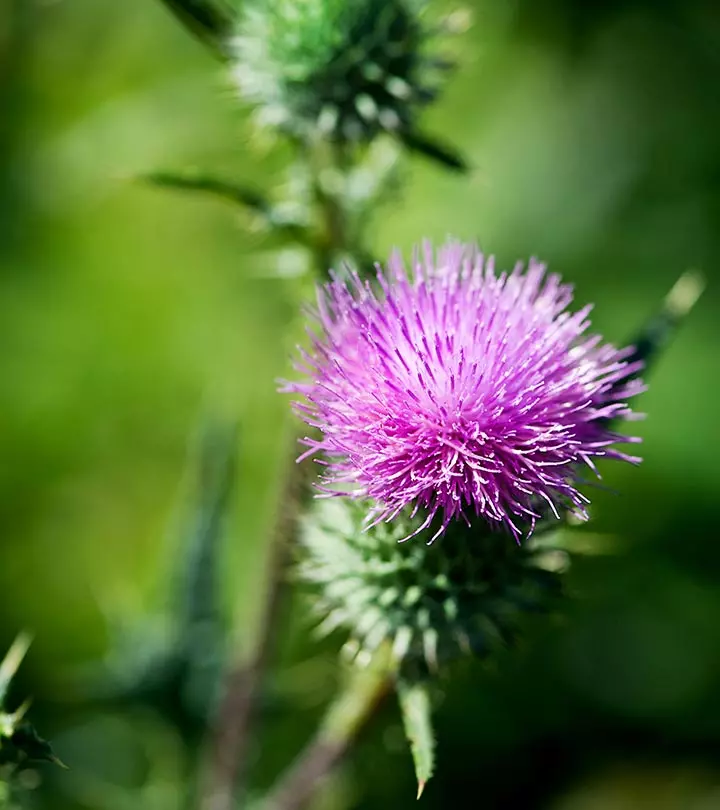
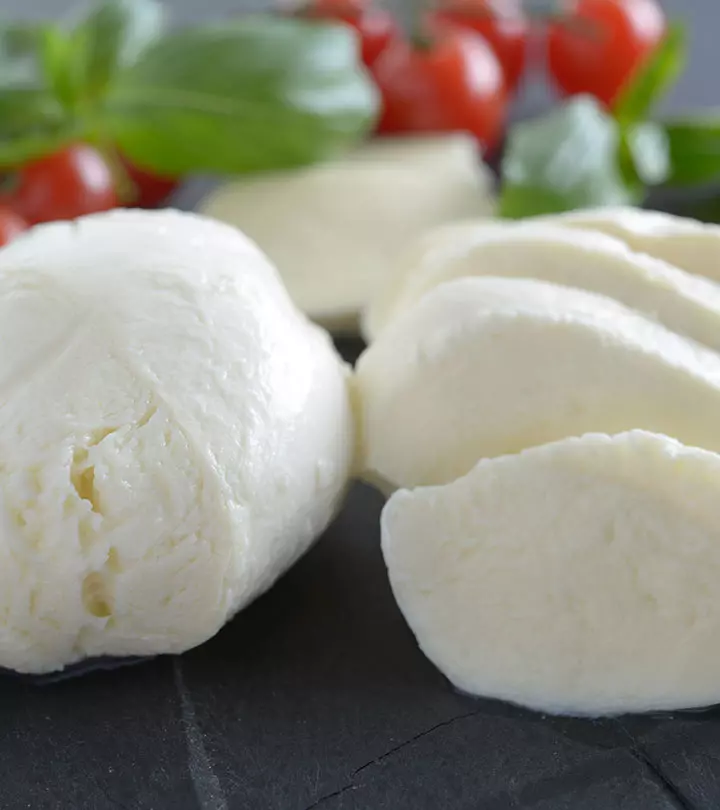
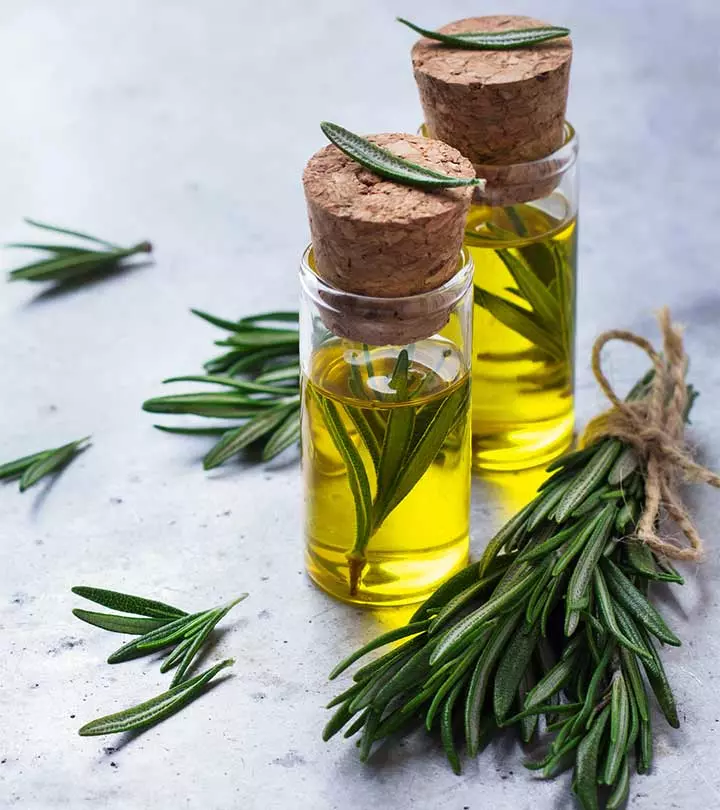
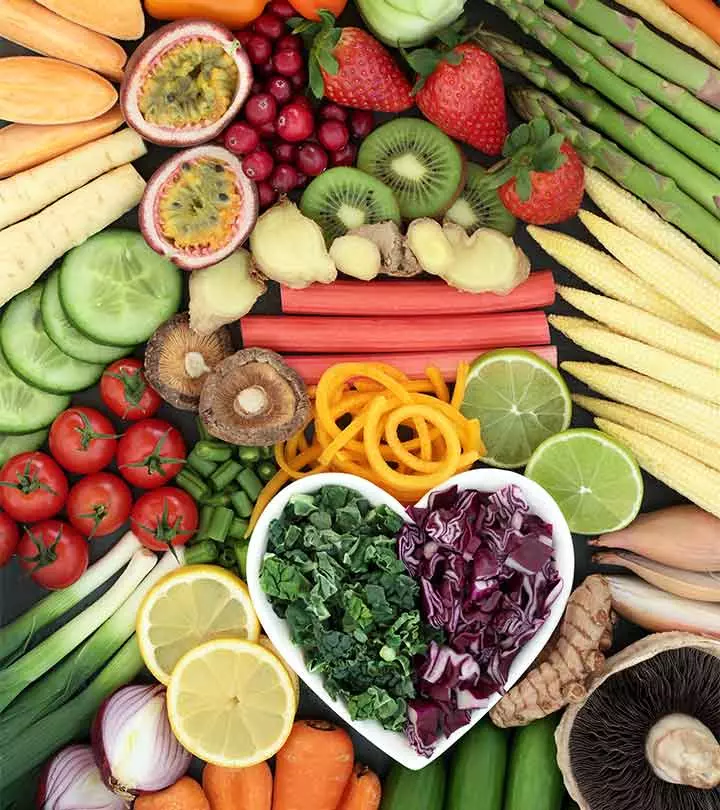
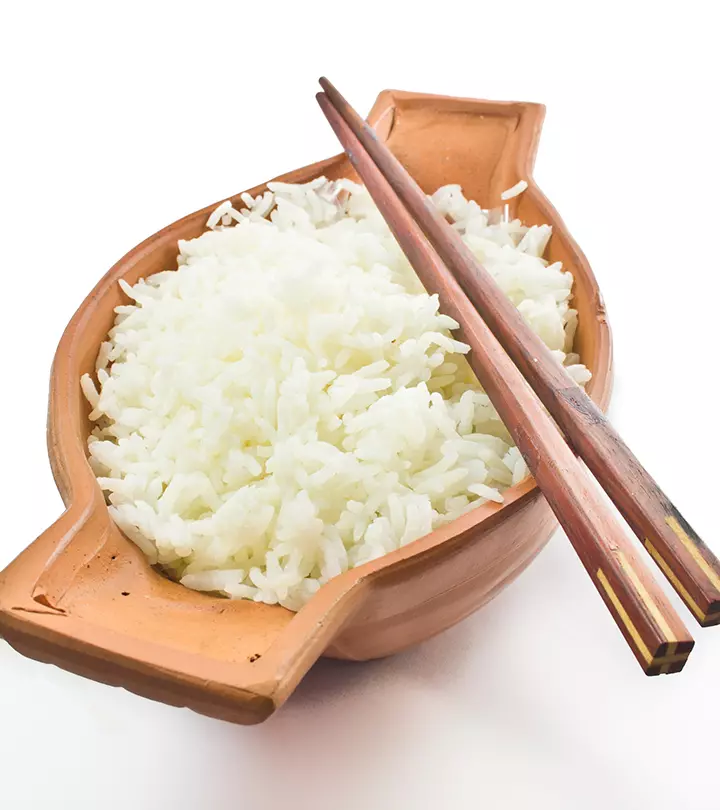
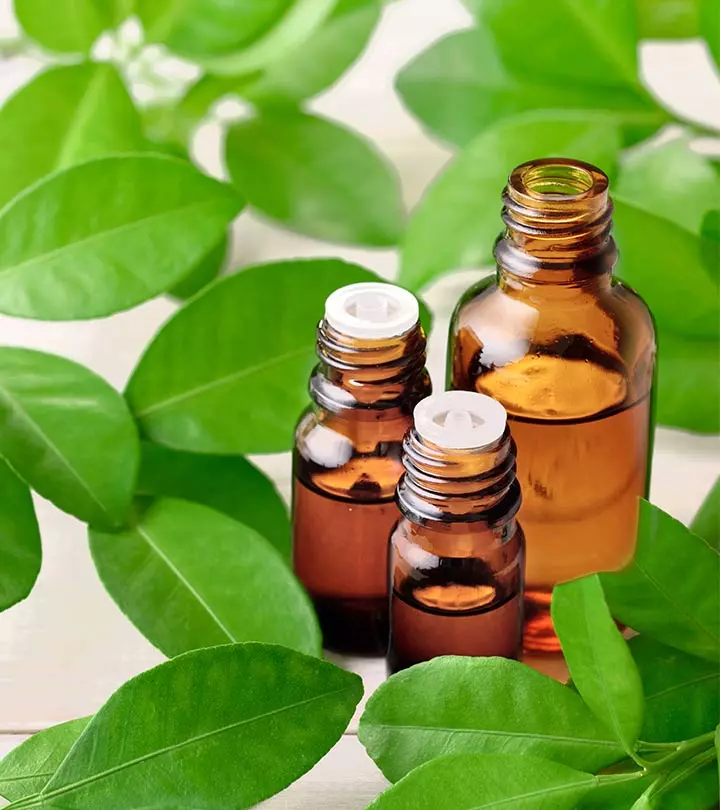
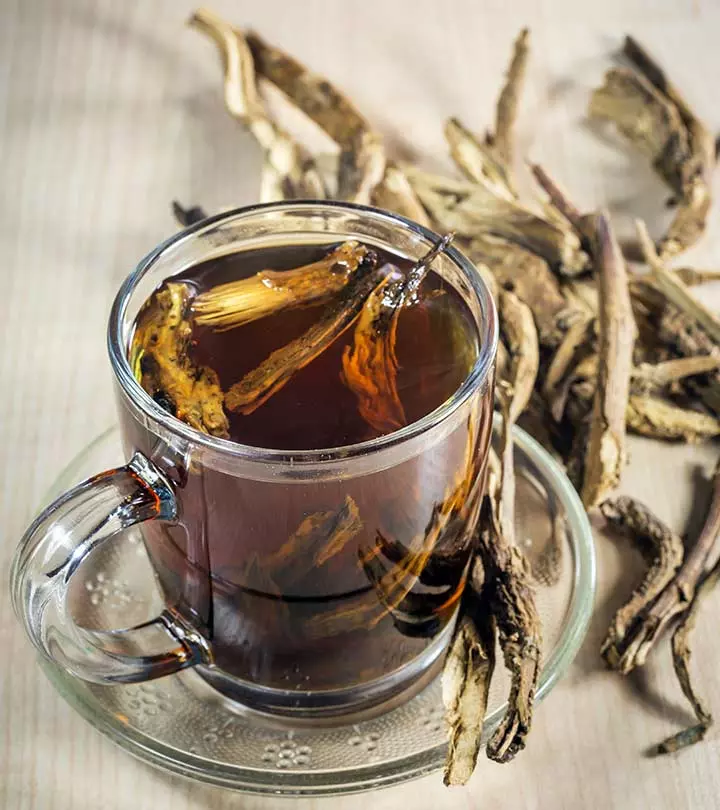
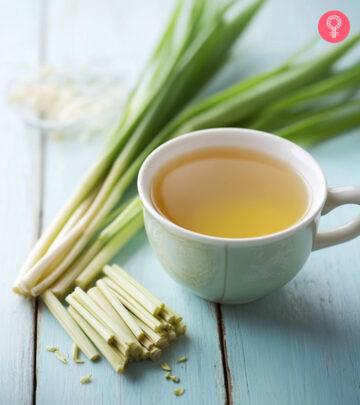

Community Experiences
Join the conversation and become a part of our empowering community! Share your stories, experiences, and insights to connect with other beauty, lifestyle, and health enthusiasts.